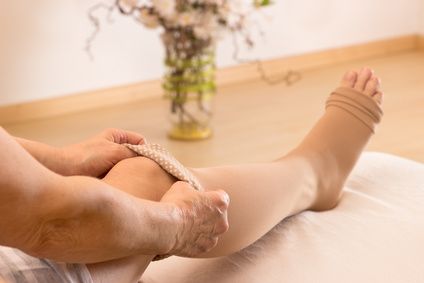Recommended specialists
Article overview
In which specialist field are lymphedema specialists active?
Lymphedema is a long-term condition in which body tissues swell. The most common location of swelling is in the arms or legs, but lymphedema can occur in tissue in any part of the body. As its name suggests, this condition is connected with disorders of the lymphatic system – a comprehensive network of channels and lymph glands running through the body, which is designed to help combat infection and drain away excess fluid.
Lymphedema can have a number of different causes – for example, it may be present at birth, or arise as a result of some damage or dysfunction of the lymphatic condition. In many cases, your primary care doctor will be aware of your medical history and will thus refer you directly to the most appropriate specialist. Though many physicians will have encountered lymphedema, a team of specialists treating this condition is most likely to include some of the following:
- a vascular surgeon, who is trained in the workings of the body’s vascular and lymphatic systems.
- a dermatologist, whose focus on treating skin conditions will help to combat swelling and disfigurement.
- an oncologist, who will understand how secondary lymphedema can develop as a result of cancer surgery, which may remove lymph nodes and thus have a disruptive effect on the lymphatic system itself.
- a reconstructive surgeon, whose skills may be used to address the problems of swollen limbs containing excess fluid.
- a physiatrist, whose medical focus on rehabilitation and lifestyle changes may help patients to function at a higher level.

Which illnesses do lymphedema specialists treat?
Lymphedema swelling can typically appear in one or both arms or legs, and the symptoms experienced can range from mild occurrences to limb sections that may swell far beyond their usual size. In cases where the swelling becomes severe, the extra weight can cause considerable fatigue, and may result in an impairment of the ability to function and perform daily activities.
Longer term, the accumulation of fluid and proteins in the tissues can lead to inflammation, which in turn eventually leads to scarring and secondary infections.
Some other symptoms, which can also accompany the swelling of lymphedema, include:
- warmth, itching or redness
- a tingling feeling or burning pains
- chills and fever
- reduced joint flexibility
- pain, aching and a feeling of fullness in the area affected
- skin rashes
Scarred and swollen limbs affected by lymphedema can also be affected by immune system malfunctions. This suppression of immune response can result in frequent infections, and perhaps lymphangiosarcoma (a malignant tumour that affects the lymph vessels).
What treatment methods are used by lymphedema specialists?
It is not possible to cure lymphedema, so treatments are designed to manage the condition by reducing the swelling and controlling discomfort and other symptoms.
Compression treatments applied to the affected limbs can help to limit swelling, as well as preventing scarring and other complications. Such compression treatments include:
- elasticated stockings or sleeves, which must fit well and produce gradual compression from the limb extremity towards the trunk.
- wrapped bandages, which must be wrapped tighter at the limb extremity and more loosely toward the trunk in order to encourage lymph fluids to flow towards body.
- pneumatic compression devices, which are special stockings or sleeves connected to a pump that supplies sequential compression to control flows towards the body. This equipment must be used as directed, and is not suitable for those with certain conditions (e.g. heart failure or deep vein thrombosis).
- manual compression, which is a massage technique to promote the drainage of lymph fluid.
- physiotherapy exercises, which a doctor may prescribe to help sustain and stimulate lymph flows.
In severe cases, surgical treatments can also be employed to remove excess fluid and tissue.
Patients affected by lymphedema must be treated with antibiotics to avoid skin and tissue infections spreading to the bloodstream and causing sepsis. In addition, good lymphedema management should include constant monitoring of the affected area for signs of infection.
In those areas of the world where there is a risk of filariasis (an infectious parasitic disease), lymphedema sufferers should be given protective medication.
What additional qualifications are required by lymphedema specialists?
Lymphatic science, or lymphology, is not presently recognised as a separate medical subspecialty. Thus, there is no specialist doctor who will have a universally accepted accreditation as a lymphedema specialist.
Though most medical practitioners would readily recognise the condition, the detail of lymphatic disorders may well be best understood by vascular surgeons, whose specialism also involves the lymphatic system. In fact, many major hospitals now offer lymphedema treatment as an internal subspecialty of vascular surgery.
To qualify, vascular surgeons must undergo a five-year residency in general surgery, before following a two-year vascular surgery training programme. In practice, it may be important to choose a doctor with experience, continuous involvement in the field and a good track record of successful treatment of lymphedema.










